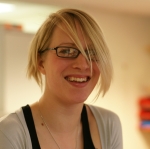LIS Research Coalition’s ‘Developing Research Excellence and Methods’ project
By Sara E Wingate Gray, on 3 February 2012
The LIS Research Coalition recently held the second of their DREaM (Developing Research Excellence and Methods) project workshops, here in London at the British Library’s conference centre. Myself and fellow UCL DIS research student Paul Gooding were lucky enough to be awarded travel bursaries last year, which enabled us to attend the first DREaM workshop up in Edinburgh, so this time it was a rather more pleasant later-morning start for us to participate!
The project itself started in January 2011 and runs until August 2012, with a purpose of developing “a formal UK-wide network of Library and Information Science (LIS) researchers” and to “explore the scope of LIS and related research, and the range of methods appropriate to research in the domain” which, as recent DIS student discussions on methods training have similarly found, is a wide and wide-ranging need.
Thus, this second workshop offered another plunge into the plethora of research methodologies for library and information professionals, this time covering Webometrics, Historical Analysis, User Involvement, and Research and Policy. Overall the day was another fantastic mix of speakers and methods presentations, as well as providing another chance for attendees to network with each other. This latter aspect of the project is actually crucial in several senses, in that both LIS practitioners and researchers can often be isolated from the wider world of their colleagues through limitations of time and geography, while artificial barriers of discipline and praxis can sometimes preclude obvious collaborations or resource and research sharing. Therefore, just being given the opportunity to take time out from the daily grind, and to meet other individuals, whose work spans the range of school, academic, public, health, and national library practices and research is, in fact, absolutely key to the fruitful development of inter-library-relations and library research and development overall. Not only this, but kindling such networks enables people to establish individual personal and practical relationships, guided by common research or professional interests: such interactions often provide the seedbed in which great new ideas, research and library projects can most easily germinate.
These elements may sound obvious, but as a matter of fact can often be overlooked, with workshops and conferences that provide jam-packed itineraries removing this crucial time for people to meet and converse. Additionally, such meetings do not necessarily find it easy to escape artificially-induced auras of camaraderie: requiring faux associations due to the fact that individuals happen to be temporarily located together. Thankfully, the DREaM project successfully navigates such concerns, not only providing time for participants to talk, but also encouraging individuals to meet each other on their own terms, enabling conversations which bridge, rather than create, gaps of practice, research and experience. It was, in fact, great to talk and brainstorm with others (that means you @MichaelStead!) who share my personal interests in the field of public libraries research and practice, as well as to receive greetings from my USA-based rad-librarian ALA posse via the human telegram that accidentally happened to be LIS researcher @joeyanne who’d just returned from ALA’s midwinter conference (Waves back from across the pond to USA librarians @pcsweeney and @detailmatters!)
Notwithstanding the awesomeness of LIS banter, biscuits and tea, once again DREaM’s medley of research methodology presentations drove the day, with an intriguing first session led by Professor Beresford from Brunel University, who introduced participants to User Involvement in Research. Professor Beresford’s session provided a useful overview of this type of research, which has “change-making as its purpose” and retains an emphasis on experiential knowledge: all arguably important facets directly correlated to specific fields within LIS. In fact, such correlation meant that more specific information on implementing such a methodology was in need, rather just the macro-view of the topic that was provided here by Professor Beresford, although useful web URLS and pointers were provided to further in-depth material during the presentation (and you can find the presentation by clicking the links above in this post). Following on from this, both Dr Haigh’s “Techniques from History” and Professor Thelwall’s “Introduction to Webometrics” were superb talks which included methodology overviews and detailed implementation tips and advice, in particular information on the appropriate software used in webometric analysis was a welcome pointer. Both these presentations were precise, informative, detailed and wide-ranging, and provided the perfect mix of information for researchers to gauge each methodology’s usefulness for disparate research needs, thus enabling tentative steps towards implementation.
The final presentation from Professor Moore focused on Research and Policy, and it was particularly interesting to hear not only how to be aware of (and hopefully clear) the hurdles of influence and agenda which can stand in the way of research implementation and impact, but also the detrimental impact of being “too far ahead” of the research and vision/strategy curve. There were, of course, no clear methods of extracting oneself or one’s research from such a visionary approach, except perhaps for a level of self-reflexivity – which enables a recognition of ‘what is possible now’ versus what is ‘just’ possible altogether, and as such was a point well considered and well made.
All in all the day was a fruitful, and helpful, day of conversing, reflecting and interacting, with LIS research at the heart of it all, so thanks must be showered upon Professor Hall as organiser-in-chief, and who introduced the day itself, alongside cheers for Professor Oppenheim, Christine Irving and others who all contributed to the day’s smooth continuation.
The final workshop in this series takes place this April, back in Edinburgh, followed by a concluding conference in July back here in London, to which it would be great to see some more UCL DIS faces, and in the meantime, you can keep track of all that is happening via the project’s website, or by stopping in on the member forum where presentation info, pictures and videos are all available too.
 Close
Close







